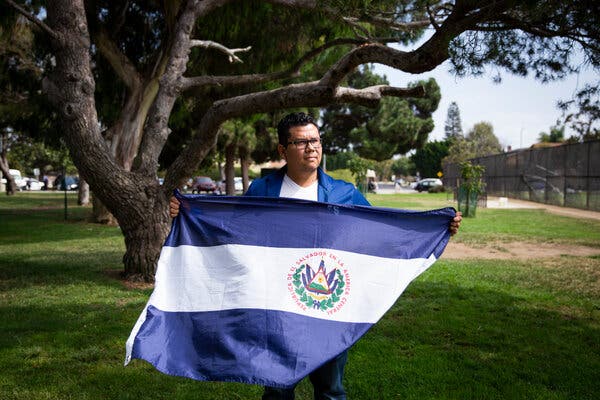Canada Adopts International Crypto Tax Reporting Standard
Canada is aimed at having the OECD standard for crypto asset tax reporting in place by 2027, as agreed with 46 countries.

Digital currency history has been made as El Salvadore becomes the first country to recognise Bitcoin as legal tender. Passing the Bitcoin Law three months ago, the government of Central America has received massive support from the Bitcoin community, but not necessarily from the nation’s citizens.
September 7th marks a new landmark day for Bitcoin as the day the first country to accept the cryptocurrency as legally recognised tender. The president of El Salvador, Nayib Bukele, remarked earlier in the day yesterday that #BitcoinDay in the country is where the country sets to “make history”.
3 minutos para hacer historia.
In 3 minutes, we make history.#BitcoinDay #BTC🇸🇻
— Nayib Bukele 🇸🇻 (@nayibbukele) September 7, 2021
Despite that the law was passed three months prior, the day did not run smoothly as the state-issued Chivo wallet hit server errors by bulk transactions. According to the president, the state wallet was disconnected while the government set to increase the servers. He noted:
“The installation problems that some people had were for that reason. We prefer to correct it before reconnecting it.”
To prepare for Bitcoin transactions in the country, the government had bought 200 Bitcoin, taking the amount held by the country to 400 BTC. With a $150-million Bitcoin fund in place to facilitate transactions from Bitcoin to US dollars, increased Bitcoin purchases and transactions are to be expected in the country. President Bukele also hinted that the country will be looking to increase the Bitcoin purchased in the near future.
The vote regarding the law to allow Bitcoin transactions was held in June, and the Bitcoin community seemed to be throwing greats support for the passing of the law. Michael Saylor, Bitcoin proponent and MicroStrategy CEO, commented on the news supporting the new law, tweeting about a plan for Bitcoin advocates to purchase $30 in Bitcoin in solidarity of the people of the country.
On September 7, El Salvador will officially begin using #Bitcoin as its national currency alongside the U.S. dollar. Every cyber hornet 🐝 I know is planning to buy $30 in BTC tomorrow in solidarity with the people of #ElSalvador and their leader @nayibbukele. Will you join us?
— Michael Saylor⚡️ (@michael_saylor) September 6, 2021
Back in June, Human Rights Foundation CSO Alex Gladstein weighed in on the plan, advocating how important it is to recognise that the El Salvadore government is choosing Bitcoin, rather than a controlled Central Bank Digital Currency, to offer greater decentralised options for its people. In an interview, he noted:
“I am so happy that they’re going with Bitcoin. I mean they could have chosen a coin that they controlled and could surveil and confiscate. And you’ve got to realize how shocking this is because that is the direction that governments are going in.”
Gladstein also noted that El Salvadore has a significant population of unbanked citizens. Bitcoin, as he commented, offers a way to provide financial stability and opportunity to those with an internet connection, but without a bank account:
“70% of the country doesn’t have a bank account, but more than 50% of the country has Internet access. So there is a significant overlap there of people whose lives are being changed as a result of this.”
However, this opportunity would require careful consideration and education for the citizens. While Bitcoin might provide massive benefits, it also runs risk without a clear understanding of how Bitcoin can work. According to a survey conducted earlier this year, this might be a risk that will threaten the country’s economy is not addressed properly.
According to a survey conducted by the local Central American University’s Institute of Public Opinion, 70% of citizens in the country thought that the Bitcoin Law should have been repealed before it was passed officially. The study also found that a massive 90% of the Salvadoran respondents admitted to a poor understanding of cryptocurrency, with 43% suggesting that the country’s economy will become worse off with the Bitcoin Law and the lack of insight into how digital currencies work.
If the Bitcoin community can offer support in training and teaching citizens about the opportunity and prospects available from Bitcoin, the economy might see the value of the Law. For now, it remains to be seen how the cryptocurrency will be utilised in the country. One thing is certain; the news of the first country adopting Bitcoin as legal tender will stand as a day worth remembering in cryptocurrency history and the adoption rate from here will be worth watching.
Canada is aimed at having the OECD standard for crypto asset tax reporting in place by 2027, as agreed with 46 countries.
Since the well-anticipated spot Bitcoin ETF event is over, some industry experts have turned to warning signals for the the road ahead.
Bitwise revealed that in the month after past BTC halving price saw a little movement but in the following year it saw significant gains.
The Blockchain for Good Alliance alliance is joined by numerous organisations including Bybit Web3, Solana Foundation, Moledao and others.